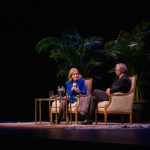Many modern Americans feel traumatized by the deep political divisions that have seemed to paralyze the government, one of the country’s most prominent historians told a Statehouse audience Tuesday.
But if one looks at the lives of the presidents who saw the United States through previous crises, it might offer some comfort, Doris Kearns Goodwin said. In fact, Goodwin sees signs that change is coming.
Goodwin was making her fourth visit to the Statehouse, this time to kick off a three-year lecture series called Capital Square Conversations. The event was put on by the Capitol Square Foundation and sponsored in part by American Electric Power.
Goodwin has written books about Abraham Lincoln, Theodore Roosevelt, Franklin Roosevelt and Lyndon Johnson. She drew from those in writing her most recent book, “Leadership: In Turbulent Times,” which asks what in those presidents’ backgrounds prepared them for the crises they faced. And she reminded the audience that those crises in some ways dwarf those of the present.
“Clearly, these are not the worst of times,” Goodwin said. “We have been through far more troubling times before. Just imagine what it was like for Abraham Lincoln. He took office when the country was already split in two, a civil war that would leave 600,000 dead was about to begin. He later said if he had known what he would face during his first months in office, he would not have thought he could have lived through it.”
Goodwin said Theodore Roosevelt, who was thrust into the presidency in 1901, faced challenges that in many ways prefigure those of today. The country was trying to come to grips with the Industrial Revolution, big companies were swallowing up small ones and rural and urban Americans were badly estranged.
“There were anarchist bombings, the gap between the rich and the poor, nationwide strikes,” she said. “Everything seemed as if democracy itself was at stake.”
FDR led the country through the Great Depression and World War II, and Goodwin said the powers of empathy that he learned from being struck down by polio at age 39 assisted him greatly. “He said you learn humility from such experiences,” Goodwin said, describing how Roosevelt had to be lifted daily from his wheelchair to exercise his upper body.
The same sense of empathy animated LBJ, for whom Goodwin worked as a White House fellow and helped with his memoirs until the end of his life.
“The older I’ve gotten, the more I realize how incredibly privileged I was to have spent so many hours with this aging lion of a man; the victor of a thousand contests domestically, and yet roundly defeated in the end by the war in Vietnam,” she said.
Meeting with reporters before her talk, Goodwin joked that the advantage of being a historian is that when she goes on TV she gets to talk about presidents past, so she usually doesn’t have to talk about Donald Trump, who is a master of keeping the spotlight on himself.
But when asked about Trump, Goodwin described Teddy Roosevelt’s work to bring the country together in the face of challenges similar to today’s.
“He said whenever you feel like people from another region are ‘the other,’ that’s when democracy would founder,” she said. “I think what’s been the problem (with Trump) is you want a president to expand the base, to go around the country and make their message go to other people. And so far, it’s been more a sense of keeping the base that’s already there.”
She said, however, that change may be coming.
“I think there’s such a desire on people’s part to somehow heal the divisions, and if the people get active … What was encouraging to me about the midterms was more people voting than ever before, more women getting into office, more (military) veterans in Congress,” Goodwin said. “Political reform is in the air.”



